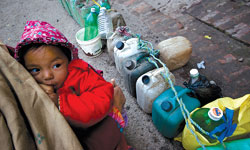|
|
The crippling fuel crisis still continues. The leadership makes cheap excuses to shift the blame. Why we don't have fuel in the country: low supplies from India and the Tarai bandh. Why we still have load-shedding: we aren't producing enough electricity to meet with growing demands. Government officials dodge questions about the fuel shortage by pointing fingers and blaming extenuating circumstances. There is no effort to find the actual causes behind the crises. No attempt at any solutions. Just blame everything and anyone else but yourself.
The political and civil leadership blame the Tarai closure but everyone knows that it is not the real reason. The actual reason is the lack of any honesty or decency.
Whenever the topic of stopping leakages comes up, the NEA makes random excuses and claims that 'just stopping leakages will not solve the problem'. But isn't it at least a start? NEA authorities themselves claim that 24 percent of electricity is leaked (although independent agencies claim that it is 33 percent). It is true that there will always be some leakage but can't we reduce the leakage to say, 10 percent? It goes without saying how important the 10-15 percent actually is.
If a normal person doesn't pay their electricity bill for two months, their line is cut immediately but the homes of ministers, and the palace never see a power cut. They threaten the NEA and use electricity however they want. Even the government doesn't dare persecute them for this. It is the same situation with the oil corporation. And this is proof that this country doesn't run on laws but on the whims of goondas.
The oil and electricity authorities have created a dozen committees to identify and solve their problems. Millions of rupees have been spent but all for what? It is well-known. The government creates committees and commissions to analyse and solve the problems but nothing happens and all that we get is the 'New Nepal.' Every other government body has already been privatised, so why not the NOC? It is clear that the NOC remains under government control for its strategic and economic value. But from Nepal's current situation, it is clear that that is not the way to go.
Those in power, and those who aspire to be in power, know very well that the NOC is a golden goose. That is why none of the parties ever talk of privatising the NOC. Like it or not, the solution to the fuel crisis remains: end the rampant corruption within the electricity and the oil authorities, and have not party-centric or minister-centric but organisation-centric management. Unless this type of management is implemented, no number of committees will be able to solve the long-term problems.
On another note, the government only looks at petroleum and hydropower as sources of fuel and electricity. There are other alternatives. Instead of petroleum, ethanol and jatropha-based biofuel, and using battery-powered cars, at least in the capital, can be considered. Various other resources can be researched, for instance briquettes, coal, sugarcane barks, and leftovers from wood mills to be used for boilers at home. If alternatives like these are not explored, the crises will never end. The government's announcement that load-shedding will end in 2011-12 is based on the current demand for electricity, by then, who knows how big the demand will be?



